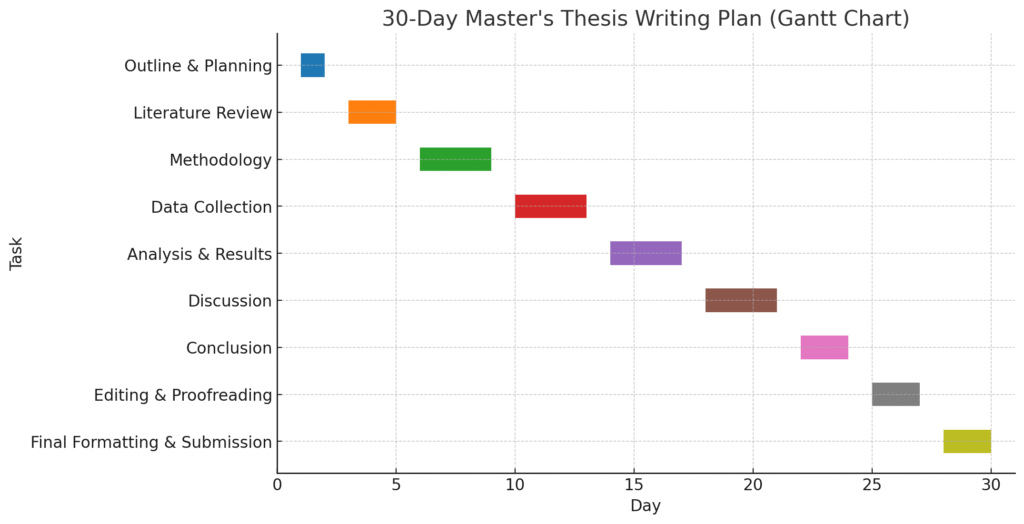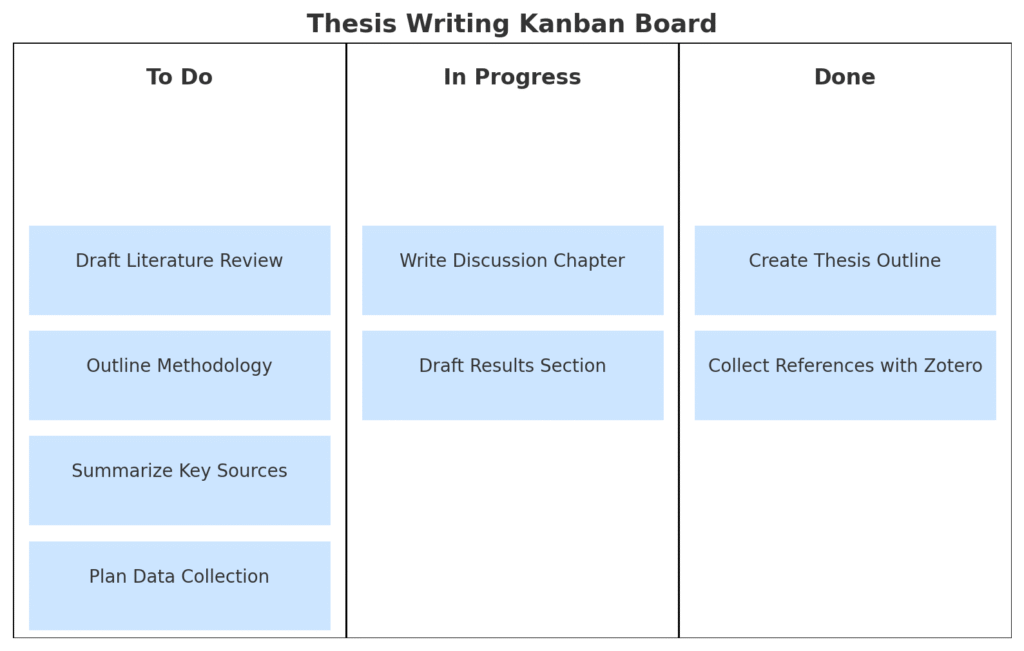Why does writing a master’s thesis feel harder than it should? For many students, it’s not just the research, it’s the endless drafts, the looming deadlines, and the pressure to get everything perfect. That weight can make even opening your laptop feel exhausting.
Here’s the truth: you don’t need a miracle or sleepless nights to get it done. You need a plan you can actually stick to. That’s where this guide comes in. I’ll show you how to complete your master’s thesis in 30 days without losing your mind.
But this isn’t another generic list of “study harder” tips. It’s a structured, realistic path that balances efficiency with self-care. You’ll learn how to set up the right tools, follow a clear routine, and stay motivated with community and mindset shifts. By the end, you’ll see that fast doesn’t mean sloppy; it means focused, steady, and sustainable.
Complete Your Master’s Thesis In 30 Days: Why 30 Days Works.
Can you really complete your master’s thesis in just 30 days? The answer is yes, but only if you understand both the power and the risks of a fast track. A short deadline builds urgency, creates focus, and gives you momentum. As Parkinson’s Law reminds us, “work expands to fill the time available.” With less time, you cut out the noise and write what matters.
But speed comes with pitfalls. Push too hard and you risk burnout, perfectionism, or slipping back into procrastination habits. The key is balance: use urgency as fuel, but protect your mental health along the way.
Phase 1: Build Your Core Foundation
1. Define a Solid, Realistic Deadline
One of the fastest ways to complete your master’s thesis is to set a clear finish line and mean it. Don’t just say, “I’ll be done by summer.” Pick an exact date, commit to it, and then work backward to create smaller checkpoints. This keeps you from drifting and gives you steady targets along the way.
A simple digital calendar works, but Gantt-type planning takes it further. A Gantt chart is a visual timeline that shows each task as a bar stretched across days or weeks. It helps you see how writing your literature review, collecting data, and editing all connect. When you can track progress this way, the process becomes a clear, manageable path toward your thesis deadline.

Here’s a simple Gantt chart showing how you can break a 30-day thesis plan into clear, time-bound tasks. Each bar represents the days allocated for that specific stage, from outlining to final submission. This kind of timeline makes progress easy to track and keeps your work on schedule.
2. Break Your Thesis into Weekly & Daily Sprints
If you want to complete your master’s thesis on time, you need to think in sprints, not marathons. Instead of saying, “I’ll write my literature review this week,” break it into smaller daily goals: “Summarize three articles before lunch, draft one subsection in the afternoon.”
Studies back this up; according to a 2019 paper in Frontiers in Behavioral Neuroscience, working in focused 90-minute sessions improves productivity and reduces mental fatigue. That’s why 1.5–2-hour sprints are ideal.
Use your weeks as broader phases: outline, literature review, methodology, results, discussion, conclusion, and revision, then use daily sprints to hit consistent targets.
Over time, those short bursts stack up, making your thesis progress steady, predictable, and achievable without last-minute stress.
3. Craft a Detailed Outline
Before you dive into paragraphs, build a map. A strong outline is the backbone of how you’ll complete your master’s thesis. Break chapters into granular subheadings: introduction, literature review themes, methodology steps, data points, and discussion arguments.
The more specific you are here, the less time you’ll waste later trying to figure out “what’s next.”
Research supports this approach: a study on electronic outlining by ResearchGate in 2025 found that outlining improves argumentative text quality and reduces cognitive load, while a 2023 study on AI-assisted writing noted improved organization and coherence through outlining.
Don’t keep the plan to yourself; share it with your supervisor early. Their feedback will catch gaps and strengthen your flow.
Outlining upfront saves you hours later and keeps your thesis structure on track from the start.
4. Gather & Organize Sources Up Front
One of the easiest ways to lose time while trying to complete your master’s thesis is scrambling for articles halfway through writing.
Do yourself a favor: collect and organize everything before you draft. Tools like Zotero, EndNote, or Mendeley act as reference managers, letting you save journal articles, add notes, and automatically format citations.
Picture it like a digital bookshelf where every source is neatly labeled and searchable. By reading and annotating early, you build a strong knowledge base and avoid last-minute stress. This simple step not only saves time but also strengthens your literature review, giving you a smoother, faster writing process.

Phase 2: Create Momentum with Routine & Focus
5. Establish a Daily Writing Habit
If you want to complete your master’s thesis without pulling all-nighters, you need rhythm. The easiest way to do that is by setting fixed writing blocks and treating them as non-negotiable. For example, choose two hours every morning before distractions hit. Over time, your brain learns: this is writing time.
To keep focus sharp, use the Pomodoro Technique. Here’s how it works: write for 25 minutes, take a 5-minute break, then repeat. After four rounds, take a longer break. Research published in National Institutes of Health shows short breaks reduce fatigue and improve retention.
This simple cycle helps you push through procrastination and build steady momentum. With consistency, progress on your thesis chapters becomes automatic.
READ ALSO: How To Write A Winning Master’s Research Proposal: Step-by-Step Guide (+ Checklist)
6. Use Templates and Writing Tools
Don’t reinvent the wheel every time you open a new chapter. If you want to complete your master’s thesis faster, start with structure. Pre-built templates give you a ready framework for introductions, literature reviews, methods, and discussions. They show you what belongs where so you don’t waste time second-guessing.
Pair templates with writing tools. Grammarly polishes your drafts, cheat-sheets simplify literature reviews, and AI drafting prompts can help you brainstorm sentences when you feel stuck.
Of course, you’re still in control; you verify accuracy and shape the argument. But these tools speed up the messy parts of writing. Instead of fighting formatting or editing every line, your energy goes into analysis and argument. That’s how you make faster progress on your academic writing.
7. Do Not Edit While Writing
One of the biggest traps students fall into when trying to complete their master’s thesis is editing while they write. It feels productive, but in reality, it slows you down and kills momentum. You end up polishing the same paragraph for an hour instead of drafting three new pages.
Writing and editing require different mindsets—one is about flow, the other about precision. Mixing them only creates friction.
Instead, separate the two. Get your ideas out first, even if the sentences are messy. Revision comes later, when you can approach the text with fresh eyes. This simple shift helps you beat procrastination and build steady progress, moving you closer to a finished thesis draft every single day.
Phase 3: Stay Motivated Mindfully
8. Track Progress & Reward Yourself
If you want to complete your master’s thesis without feeling stuck, you need to actually see your progress. Visual tools make a huge difference here. A simple checklist, a habit tracker, or even a kanban board (with columns like “To Do,” “In Progress,” and “Done”) gives you a clear picture of how far you’ve come.
Visible progress boosts motivation because your brain releases dopamine when you check off tasks. Pair that with small rewards, maybe a favorite snack, a short walk, or an episode of your go-to show, and you’ll reinforce the habit.
Tracking progress keeps you consistent, and those little celebrations help maintain motivation over the period of your thesis writing.

9. Adopt a Support Network
Surrounding yourself with the right people can make it easier to complete your master’s thesis faster. Pair up with a peer, or find an accountability partner who will notice when you’re slipping. Peer accountability improves persistence in long-term projects.
Don’t forget your supervisor either; schedule regular check-ins to get feedback and stay aligned.
A solid network keeps you motivated, reduces stress, and helps you push through procrastination, maintain steady progress.
10. Be Kind & Flexible
When you’re working to complete your master’s thesis, it’s easy to set rigid goals and then feel defeated when life happens. But here’s the truth: progress is a process. It’s not always linear.
Some days you’ll write three solid pages, other days just a few sentences. That doesn’t mean you’re failing. It means you’re human.
Being kind to yourself means adjusting daily goals without guilt and focusing on the bigger picture. Perfection isn’t the goal, steady movement is.
By staying flexible, you protect both your momentum and your mental health, which is what gets you to the finish line of your thesis writing.
READ ALSO: 15 Common Academic Project Writing Mistakes Students Make (And How to Avoid Each One Like a Prof.)
Phase 4: Polish & Submit
11. Iterative Review Process
Finishing your draft isn’t the end; it’s the beginning of refining it.
To complete your master’s thesis at a high standard, you need to review in cycles. After drafting, take a short break so you can return with fresh eyes. This helps you spot gaps in clarity, weak transitions, or sections that don’t flow.
Use editing tools for grammar and readability, but don’t rely on them alone. Ask a peer or mentor for feedback; they’ll notice issues you might overlook.
Each round of revision sharpens your argument, improves academic writing quality, and builds cohesion across chapters.
12. Formatting & Final Touches
The final stage of your thesis is the presentation. To complete your master’s thesis properly, you must meet every formatting rule your university requires.
Use pre-set templates for margins, headings, and spacing so you don’t waste hours fixing details later. Standardize your references with a reference manager like Zotero or EndNote to avoid costly citation errors. Double-check visuals, charts, and tables for consistency and clarity.
Most importantly, review the submission guidelines line by line. Universities can reject work over formatting mistakes, even if the content is strong.
By nailing these details, you protect months of effort and ensure your thesis submission is polished, professional, and ready for approval without unnecessary setbacks.
13. Self-Care & Stress Management
When the deadline feels close, it’s tempting to push yourself harder, but neglecting your health will slow you down in the long run. To complete your master’s thesis successfully, you need your body and mind working together.
Simple habits make a huge difference: take short walks to clear your head, schedule real breaks instead of scrolling aimlessly, and stick to a sleep routine. Students who manage stress with rest and exercise perform better on long projects.
Remember, your thesis is a marathon, not a sprint. Protecting your mental health and physical energy ensures you finish strong, not burned out, with a clear focus on delivering your best thesis writing.
Bonus: Advanced Strategies for Extra Efficiency
1. Use AI Intelligently
AI can be a powerful ally when you’re working to complete your master’s thesis, but only if you use it wisely.
AI tools can help you brainstorm structure, generate draft sentences, or rephrase awkward sections. Prompt-based drafting is especially useful for breaking through writer’s block. But here’s the catch: you must always verify citations, data, and arguments yourself. AI isn’t a substitute for your own critical thinking.
Platforms like Research Rebels show how structured prompts can speed up writing, yet they also stress the importance of review.
Think of AI as an assistant, not an author. Used carefully, it saves time, reduces stress, and keeps your thesis writing process moving without replacing your own expertise in academic research.
2. Agile Project Management
Borrowing from the tech world, Agile methods can help you complete your master’s thesis more efficiently. Instead of treating your thesis as one giant project, break it into short sprint cycles, focused periods where you tackle a specific task, like drafting your methodology or editing one chapter.
Kanban boards, whether physical or digital, give you a clear view of tasks in progress, pending, or completed. Tools like Trello or Jira make this process simple.
By applying this mindset, you gain structure without rigidity. Sprint cycles and boards turn overwhelming thesis work into a steady flow of progress, keeping both your academic writing and time management on track.
3. Track Progress & Reward Yourself with Version Control
When working to complete your master’s thesis, keeping track of drafts can be messy. Saving multiple files like “thesis_final_v7.docx” often leads to confusion or worse, losing important edits.
That’s where version control with Git or GitHub comes in, especially if you’re writing in LaTeX. These tools let you track every change, roll back if needed, and collaborate seamlessly if you’re working with peers or advisors.
They also protect against file corruption, which can derail weeks of effort.
By integrating version control into your workflow, you bring clarity and safety to your thesis writing process. It’s a practical way to safeguard progress while building momentum toward your academic research goals.
READ ALSO: What to Look for in a Thesis Writer: 7 Qualities That Make All the Difference
4. Structured Prompting via Chatbot
AI chatbots can do more than generate text, they can help you think. When trying to complete your master’s thesis, structured prompting can guide you through brainstorming, outlining, or even rewriting sections.
For example, you might ask a chatbot to suggest three ways to frame your methodology, then validate those options against your sources. It’s like having a thinking partner that helps you stay organized and creative.
The key is ongoing validation: you double-check every fact, citation, and argument before using them. Done right, chatbot prompts save time, reduce decision fatigue, and give you fresh perspectives that sharpen your thesis draft and strengthen your overall academic writing.
Conclusion
Yes, you really can complete your master’s thesis in 30 days. With structure, the right tools, and a balanced approach, progress becomes steady and achievable. The key is not chasing perfection, but building momentum, staying consistent, and caring for your mental and physical health along the way. Adjust when needed, celebrate small wins, and remember finishing strong matters more than working endlessly.
Want even more hands-on support? Our Academic Craft team of UK-focused academic writing experts helps master’s students like you at every stage, from outlining and literature reviews to editing and final submission.
Think of it as having a guide who’s already walked the path. Ready to make thesis writing easier? Reach out to us today via WhatsApp.



